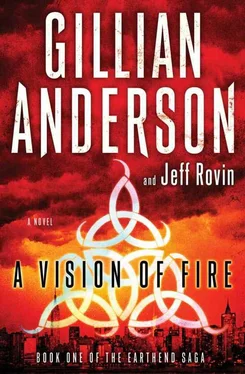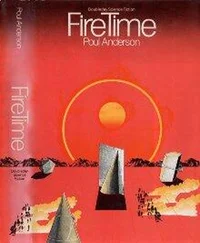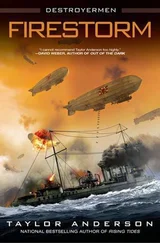After hanging up, Flora went back downstairs and paced near Arni’s head while Mikel looked for clues about his death. She was cursing the Group through the disposable medical mask she had put on, angry that they did not have the equipment or personnel suitable to perform a fast autopsy.
“And look at that—Arni wasn’t even wearing his lab coat,” she railed. “God only knows what contaminants his body is adding to the environment.”
“You mean apart from liquefied brain tissue?” Mikel asked. He was also masked and kneeling beside the corpse.
She stopped pacing. “Is that what you think that is?”
“Judging by the color and small lumps of solid mass, I’d say so.”
“Lovely,” Flora said. “Nothing else unusual?”
“Not that I can see. Only the brain is where it shouldn’t be.”
She snatched latex gloves from a box on a shelf and began pawing over Arni’s table—an insufferable mess—until she found a glass stirring rod. Then, squatting beside the corpse’s head, she inserted the end of the rod into his left nostril.
“It looks like he was about to be mummified,” Mikel muttered. “Brain out, organs next.”
“His other organs still appear to be inside,” she observed.
“Maybe I scared off whoever was doing this.”
“This liquid has a film forming on top,” she said, referring to the pool that spread like a halo from Arni’s head. “He’s been this way for a while.”
“But you didn’t hear anything?”
“Soundproofing,” she said, while paying acute attention to the shape of Arni’s nasal cavity. Flora twisted and turned the glass rod until all but the half inch she was holding had disappeared up his nose into his skull.
“My god,” she said, marveling, “there’s no sinus wall, no sphenoid bone. Mikel, there is nothing up there.”
“Are you saying everything in his skull came out of his nose?” he said in a tone of total disbelief.
“Would you like to feel it?” She motioned with the end of the glass rod.
“No,” he said, wincing slightly. “What would do that to some of his cranial bones but not the whole skull?”
“Perhaps we haven’t seen it all,” Flora replied, setting the rod on the table. She touched Arni’s head with the toe of her boot, half-expecting it to cave under the pressure. It did not. “Damn it,” she said. “I hate a mystery without enough time to solve it.”
As if on cue, Casey Skett arrived, still as skinny and slack-eyed as he had been a decade earlier when Flora first found him. Mikel went upstairs to admit him and they rode down in the elevator. Casey worked for the Department of Sanitation, “DAR” division—dead animal removal. He was good at his job, but Flora also appreciated his discretion and his connection to the shelters—specifically, the ones with incinerators. He lifted Arni’s body into a refrigerator on wheels with its contents and shelves removed. If anyone happened to notice Casey wandering around the shelter before dawn, he would say he was cleaning up more of the dead, decaying rats that had been in the news—did they want to take a look inside?
Flora and Mikel then spent forty-five minutes triple-washing the floor and two agonizing hours scrutinizing every inch of the laboratory and the locker room for anything that might catch the eye of a police officer. Then Flora went ahead and scuffed and dirtied things up, so the lab didn’t look too scrubbed.
When they were done, Mikel went about seeking a potential cause. He’d noticed hours ago that his carved meteorite was sitting on the table and the Geiger counter was out. He approached the object cautiously and waved the wand over it for several minutes but nothing happened. Finally, he picked it up, wrapped it in cloth, and strode to the safe to stow it.
“Not there,” Flora said. “We’re putting all the relics in the deep freezer.”
“For what?”
“As a precaution,” she replied.
“Don’t you think you’re overreacting?” Mikel asked.
“As my great-uncle Commander Hunt said during the Blitz, ‘One cannot overreact to this.’ Anyway, it’s my prerogative.”
“But we don’t know that this or any of them had anything to do with Arni’s death.”
“We don’t know they didn’t.”
“That argument is ridiculous,” he said. “We have to try and reconstruct what he was doing—”
“And we will, after we’ve had a pause and a good think. I’ve read your report about the trip. There isn’t a damned thing in this building that we know as little about.”
His impatience evident, he held up his find. “Which is why we need this here, now. This has more writing than any of them. We can learn from it.”
“We will,” she said. “Please, Mikel—consider all that’s happened already, the rats in Washington Square, the birds around your plane. Those phenomena all have artifact proximity and they began after this thing started its journey.” She shook her head ruefully. “Arni was a synesthete. These objects may be connecting with animal and possibly human consciousness on some level. Perhaps there was something emitted by this rock at an inaudible frequency, triggered by a certain kind of light or sound, perhaps, for example, the electrical output of an airplane or a Geiger counter.”
“The rats weren’t anywhere near my artifact.”
“They were not,” she agreed. “But they came running here, to the collection. Which is why I want all the objects stowed and stabilized until we’ve examined this more thoroughly.”
Mikel shook his head. “That’s the reason we have to keep studying them now , Flora, while they are being influenced. And I mean, why freeze it? Why not superheat it?”
Flora snatched it from his hand.
“You’re being a little extreme here,” he said.
“Arni is dead!” she said, showing the first real sign of emotion.
“I’m sorry too but we have a bigger picture here,” Mikel insisted, “a force we don’t understand and that we haven’t understood for a long damn time. Being able to read some of the symbols is one thing. We’re getting pretty good at that. Understanding the mechanics of these objects is bigger.”
“You don’t think I know that?”
“Of course you do. Look, this thing has obviously been through tremendous heat before and survived. Arni didn’t heat it—no burner. No cigarette lighter. I don’t think we’re going to know the full extent of its functionality until we start ruling things out.”
Flora turned away. “It goes in the deep freezer with the rest, since we know that all of these artifacts have survived low temperatures for thousands of years without killing anyone, and that’s final .”
“How do you know that?”
She half-turned. “What?”
“That they haven’t killed anyone before?”
She hesitated for the briefest moment. “You’re right. I don’t know. All the more reason for caution.” Then, without another word, she went to the locker, loaded all the objects onto a tray, and navigated to a room down the hall. She packed each item in a plastic bag and put them away. When she returned, Mikel was leaning on the wall outside the lab, pouting. She flicked off the light, slammed the door shut, and followed him up the stairs.
“Go home,” she said. “Get some rest.”
“I’m rested. I want to work.”
“Then go to the library and read. Finish watching the videos Erika collected.”
“Why are you being like this?”
“Like what?” she asked. “Thinking?”
Mikel said nothing as they neared the landing. The old stairs creaked as they ascended in the near-darkness. Upstairs the phone was already ringing. Mikel fielded the first call from the police. Arni had been reported missing at seven a.m. by a friend he was supposed to meet the night before, and the floodgates opened. Flora was glad she had put the artifacts away: only now it occurred to her that they may have been seized as evidence.
Читать дальше












